-
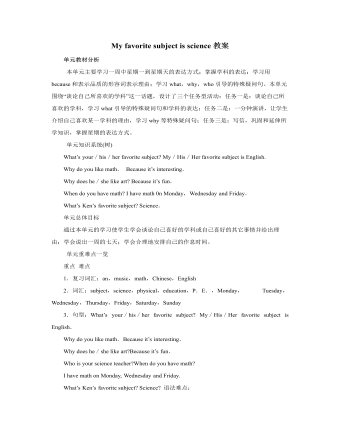
人教版新目标初中英语七年级上册My favorite subject is science教案
本单元主要学习一周中星期一到星期天的表达方式;掌握学科的表达;学习用because和表示品质的形容词表示理由;学习what,why,who引导的特殊疑问句。本单元围绕“谈论自己所喜欢的学科”这一话题,设计了三个任务型活动:任务一是:谈论自己所喜欢的学科,学习what引导的特殊疑问句和学科的表达;任务二是:一分钟演讲,让学生介绍自己喜欢某一学科的理由,学习why等特殊疑问句;任务三是:写信,巩固和延伸所学知识,掌握星期的表达方式。单元知识系统(树)What’s your/his/her favorite subject? My/His/Her favorite subject is English.Why do you like math. Because it’s interesting.Why does he/she like art? Because it’s fun.When do you have math? I have math 0n Monday,Wednesday and Friday.What’s Ken’s favorite subject? Science.单元总体目标通过本单元的学习使学生学会谈论自己喜好的学科或自己喜好的其它事情并给出理由;学会说出一周的七天;学会合理地安排自己的作息时间。

人教版新目标初中英语七年级上册What time do you go to school教案
知识与能力复习词汇time,morning,breakfast,get up,g0 t0 bed,homework,clock,afternoon,lunch,run,watch TV,evening,dinner,eat,usually,o’clock,thirty,fifteen,take a shower,go t0 school等;引导学生复习、巩固“询问和谈论时间”的目标语言并运用所学知识安排自己的学习和课外活动。过程与方法运用Summarizing,Classifying和Comparing的学习策略。在复习教学中,运用听写、提问、对话演练与调查活动,促使学生不断地使用所学内容,从而提高他们灵活运用知识的能力。情感态度价值观本部分的主要内容是复习“日常作息时间”的询问和表达。通过互相询问或谈论自己或对方的作息时间安排和活动计划,培养学生良好的作息习惯和守时习惯。教学重、难点及教学突破重点复习词汇time,morning,breakfast,get up,g0 to bed,homework,clock,afternoon,lunch,run,watch TV,evening,dinner,eat,usually,o’clock,thirty,fifteen,take a shower,go to school等;引导学生复习、巩固“询问和谈论时间”的目标语言。
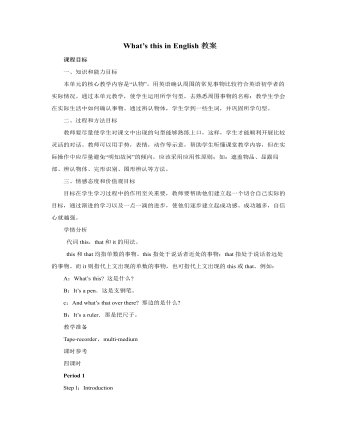
人教版新目标初中英语七年级上册What’s this in English教案
一、知识和能力目标本单元的核心教学内容是“认物”。用英语确认周围的常见事物比较符合英语初学者的实际情况。通过本单元教学,使学生运用所学句型,去熟悉周围事物的名称;教学生学会在实际生活中如何确认事物。通过辨认物体,学生学到一些生词,并巩固所学句型。二、过程和方法目标教师要尽量使学生对课文中出现的句型能够熟练上口,这样,学生才能顺利开展比较灵活的对话。教师可以用手势,表情,动作等示意,帮助学生听懂课堂教学内容,但在实际操作中应尽量避免“明知故问”的倾向,应该采用应用性原则;如:遮盖物品、显露局部、辨认物体、完形识别、图形辨认等方法。三、情感态度和价值观目标目标在学生学习过程中的作用至关重要,教师要帮助他们建立起一个切合自己实际的目标,通过渐进的学习以及一点一滴的进步,使他们逐步建立起成功感。成功越多,自信心就越强。

人教版新目标初中英语八年级上册Can you come to my party教案3篇
Step 3 (3b)First, tell the students when we talk about our future plans, we often use: I’m+verb+ing When we talk about what we must do, we use have to. Ask the students to fill in the blanks in 3b. The answers are: shopping, go to see, a test, I’m going, my family. Step 4 (3c)Let the students write an e-mail message to a friend. Say why you can’t visit next. Before the exercise, ask the students to give some possible answers and write them on the blackboard. So the students will feel easy to finish the writing exercise. After they finish it, Let them to correct it in groups first. Each group chooses theirs best one to read in front of the whole class. Step 5 ( planning a party )First read the conversation in the box together. Then ask the students to turn to page 88.Write down everything you have to do next week. Write in all the things you have to do . Ask the students to look at the list. Ask them “What day are you free?” This is when you can have your party. Step 6 (Self check 1 )Let the students to fill in the blanks with the words given. Change the forms of the words if possible. Then make their own sentences. The answers are: visit, playing, have to, study, comeStep 7 (Self check 2)Imagine you are Marie. Read the information and look at your schedule. Write replies to the invitation.
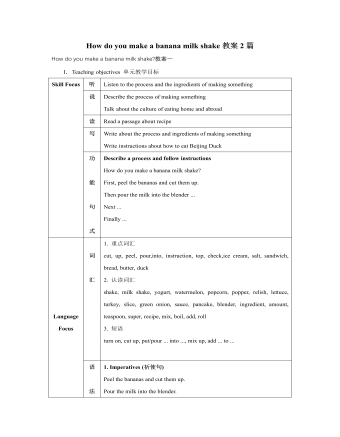
人教版新目标初中英语八年级上册How do you make a banana milk shake教案2篇
1. First, ... then, ... next, ... finally, ...首先,……然后,……接着,……最后,……这是英语中表达做某事的步骤的一种说法。如果步骤较多,还可以说:first-next-after that-later on-finally/at last通常你会听到说英语国家的人在说 first, next, then, finally 和后面的内容时,他们会做一些停顿。这样就能提前告诉听者接下来讲的是一系列的步骤。这一点在朗读和听力中应特别注意。2. how many, how much均为疑问词,同是“多少”,但用法不同。请看:how many修饰可数名词复数,how much修饰不可数名词。但在用法上,同学们常犯如下错误:1) [误] How many are there bananas on the table?[正] How many bananas are there on the table?[析] how many, how much 中的many,much是形容词,常修饰名词作定语,故后面跟名词。2) [误]How much tea are there on the table?[正]How much tea is there on the table?[析] how much修饰不可数名词时,谓语动词用单数。how many与how much的区别可简记为:前how many:问“多少”,复数名词后面跑;how much问“多少”,不可数名词单数好。前者答语用基数词,后者答语用数量关系。
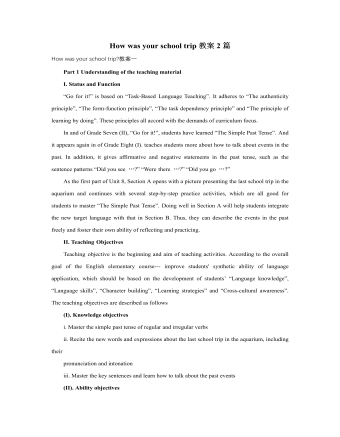
人教版新目标初中英语八年级上册How was your school trip教案2篇
“Go for it!” is based on “Task-Based Language Teaching”. It adheres to “The authenticity principle”, “The form-function principle”, “The task dependency principle” and “The principle of learning by doing”. These principles all accord with the demands of curriculum focus.In and of Grade Seven (II), “Go for it!”, students have learned “The Simple Past Tense”. And it appears again in of Grade Eight (I). teaches students more about how to talk about events in the past. In addition, it gives affirmative and negative statements in the past tense, such as the sentence patterns “Did you see …?” “Were there …?” “Did you go …?” As the first part of Unit 8, Section A opens with a picture presenting the last school trip in the aquarium and continues with several step-by-step practice activities, which are all good for students to master “The Simple Past Tense”. Doing well in Section A will help students integrate the new target language with that in Section B. Thus, they can describe the events in the past freely and foster their own ability of reflecting and practicing. II. Teaching ObjectivesTeaching objective is the beginning and aim of teaching activities. According to the overall goal of the English elementary course--- improve students' synthetic ability of language application, which should be based on the development of students’ “Language knowledge”, “Language skills”, “Character building”, “Learning strategies” and “Cross-cultural awareness”. The teaching objectives are described as follows(I). Knowledge objectivesi. Master the simple past tense of regular and irregular verbsii. Recite the new words and expressions about the last school trip in the aquarium, including their pronunciation and intonation

人教版新目标初中英语八年级上册Could you please clean your room教案3篇
一、 教学内容Section A 1a----1c二、 教学目标1.学习词汇do the dishes, make the bed, take out the trash, fold the clothes, do the laundry, sweep the floor, clean the living room.2.句型 Could you please clean your room? Yes, sure.三、 教学准备 学生预习本单元所有的词汇多媒体课件 活动表 奖品四、 教学过程Pre-task1. Warming upEnjoy ourselves. Watch cartoon Cinderella. 看动画片段《灰姑娘》导如入本课话题和新词汇“chores”美丽善良的鬼姑娘因继母的嫉妒,每天得做所有的家务。片段的主题使学生联想到本课的话题。2. learn new words and phrasesLook! What is she / he dong? 看图学习动词词组do chores, do the dishes, make the bed, take out the trash, fold the clothes, do the laundry, clean the living room.3. Guessing game.What is she doing ? 4. Pair work. 1a, Do you do these things at home? Write “Y” for “yes” and “N” for “no”.5. Listening . 1b , Peter’s chores or Mom’s chores?理解目标语Could you please clean your room? Yes, sure.Write “M” for Mom’s chores, “P” for Peter’s chores in the chart.6. PairworkLook at the picture,Ask your partner to do the chores that you see. 7. Interview Who is the most able at home? 1) What chores do you do at home? How often do you do the chores? Work in four, interview each of the students in the group, fill in the chart.

人教版新目标初中英语八年级上册What are you doing for vacation教案2篇
Teaching goals : 1. Words & phrases: babysit ,get back , fishing , rent , think about , decide(on) , tourist etc. 2. How to talk about future plans . 3. 现在进行时表示将来计划或行动. 4. 特殊疑问句(where , when , how long引导) Important and difficult points : Drills :What are you doing for vacation ? I’m watching TV . When are you going ? I’m going … . How long are you staying ? We’re staying for five days . Teaching aids : cards and a tape ,a large wall calendar . Period 1 Teaching procedures : Step 1Leading in1. Free talk . 2. Put up the wall calendar . T: I’m staying home on Saturday (pointing to next Saturday ).Ss repeat . Ss: I’m staying home on Saturday . T: OK. Today we’ll learn how to talk about future plans. Step 2Pre-task SB Page 13 , 1a . 1. Look at the picture carefully and tell what you see in the picture . 2. Write the activities from the pictures in the box and add some more . 3. Practice reading . Step 3While-task1. Using the activities we write in 1a to make conversations .For example :What are you doing for vacation ? I’m visiting my uncle . 2. Pairwork .Practice in pairs . 3. 用第三人称练习对话.
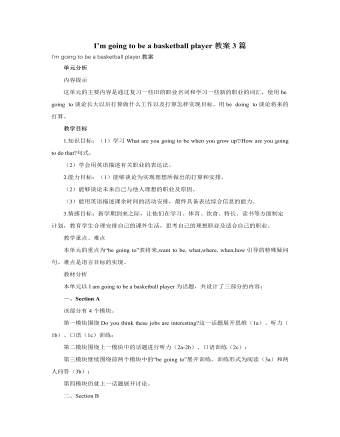
人教版新目标初中英语八年级上册I’m going to be a basketball player教案3篇
教学目标1.知识目标:(1)学习What are you going to be when you grow up?/How are you going to do that?句式。(2)学会用英语描述有关职业的表达法。2.能力目标:(1)能够谈论为实现理想所做出的打算和安排。(2)能够谈论未来自己与他人理想的职业及原因。(3)能用英语描述课余时间的活动安排,最终具备表达综合信息的能力。3.情感目标:新学期到来之际,让他们在学习、体育、饮食、特长、读书等方面制定计划,教育学生合理安排自己的课外生活,思考自己的理想职业及适合自己的职业。教学重点、难点本单元的重点为“be going to”表将来,want to be, what,where, when,how引导的特殊疑问句。难点是语言目标的实现。教材分析本单元以I am going to be a basketball player为话题,共设计了三部分的内容:一、Section A该部分有4个模块。第一模块围绕Do you think these jobs are interesting?这一话题展开思维(1a)、听力(1b)、口语(1c)训练;
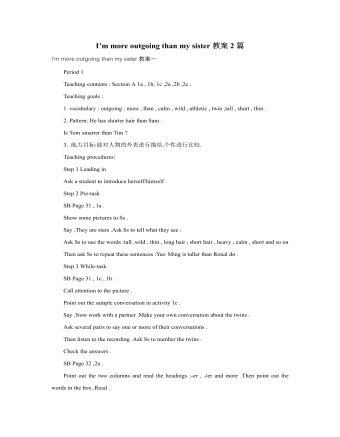
人教版新目标初中英语八年级上册I’m more outgoing than my sister教案2篇
1 交通工具的比较此活动为小组活动。学生通过讨论找出到达某一城市可乘坐的各种交通工具,并选择最佳出行方式。Teacher:We’re going to Shanghai. How many ways can we use to get there? Yes, there are four ways: by bus, by plane, by train, by ship. Please discuss how you are going to get there.操作建议:(1)学生以小组为单位展开活动,谈论本组所选择的交通工具。(2)各组选代表向全班汇报,阐述本组所选择的交通工具的利和弊。完成任务所需要的语言结构:We can go there by ship. It’s more comfortable and cheaper than any other transportation.We can go there by bus. It’s cheaper but it takes longer time.2 哪个城市更合适?此活动具有挑战性。假设中国要举行2014年世界杯足球赛,分别从历史,人文,天气等方面对各城市(北京,大连,上海,昆明)进行比较,选择最佳举办城市。T: Imagine China is holding the 2014 FIFA World Cup. Which city do you think is the best for the World Cup, Beijing, Dalian, Shanghai or Kunming? Let’s work in groups. If you choose Beijing, please join the Team Red. If you chose Dalian, please join the Team White. If you choose Shanghai, please join the Team Blue. If you choose Kunming, please join the Team Green. Please show us its advantages. Then let’s see which team will win.
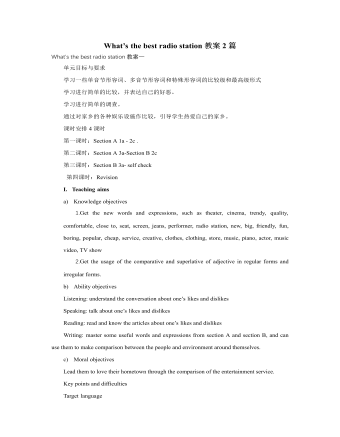
人教版新目标初中英语八年级上册What’s the best radio station教案2篇
教学重点和难点:运用所掌握的语言描述,比较不同地点的特点。在练习中学习掌握英语比较级和最高级的用法。课前准备分配小组,每组五至六人。通过上网或翻阅报刊杂志等方法,确定旅游线路,做出基本的旅游计划。教学设计:本节课流程图 学法指导:1.由于这是一堂新课,在教学中应注意面向全体,发挥学生的主体性,引导学生积极参与,激发学生的求知欲和学习积极性,指导学生积极思维,主动获取知识,养成良好的学习方法。逐步学会独立解决问题。总之要尽可能调动学生的非智力因素促进智力因素的发展。教法选择:1.电化教学法2.课堂讨论法3.任务型教学法采用这些方法的目的是为了充分调动学生的学习积极性,使学生变被动学习为主动学习。通过电脑形象的演示,加强印象,提高兴趣,突破难点,提高教学效率,进而增大教学的容量和信息量。充分体现教师为主导,学生为主体的教学原则。
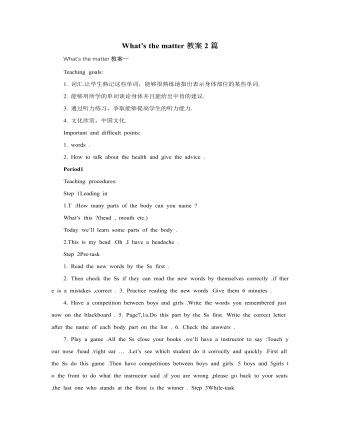
人教版新目标初中英语八年级上册What’s the matter教案2篇
She shouldn’t go to the party tonight.Step7. TaskT: You know, there are lots of problems in our life. If you are a doctor, please tell us how to solve the problem. I will divide you into 9 groups. Please work in groups. And then choose one of you to report your ideas.The following are the problems:I have a toothache.I am hungry. I have a sore throat.I am stressed out. I have a sore back.I am tired. I can’t sleep.I have a cold. I have a headache.Report: If you have a headache, you should go to bed early. You should see the doctor. You should eat some medicine. You shouldn’t wash your face with cold water.You shouldn’t sleep late.You shouldn’t swim.…..T encourages the students to give advice as much as possible.Homework:1. Chose one of the problems, and write down your advice2. Copy the new words这一步是用于热身的,同时也可以让他们复习一部分的表示人体部位的单词,扩充知识.学习语言的过程也是一个不断积累的过程,复习旧知识,增添新知识.通过小游戏,强化学生对Does she/he have…这个句子的运用能力.通过复习,自然的引到下面新知识的学习。充分利用表格,由句子到对话,再到文章,让学生循序渐进. 提高学生的综合语言运用能力,运用以前学过的知识来解决身边的问题.Period 5 (Section B 3a—3c, selfcheck)教学内容与分析:

人教版新目标初中英语八年级上册How do you get to school教案2篇
Step Ⅶ Role play ( Work on 1b)1. First ask two students to read the dialogue to the class.Sa: How do you get to school?Sb: Well, I ride my bike to the subway station. Then I take the subway.2. Now work with a partner.Suppose you use two kinds of transportation to get to school \Hangzhou\Beijing... (bus, train, subway, walking, bike, etc.) Tell how you get there. You may use the phrases in 1a.3. Then ask different pairs of students to present their conversations to the class.Step ⅧListening1. Work on 2a(1) First ask students to read the list of information that Thomas wants to know.…where Nina lives.…how far from school she lives.…how long it takes to get to school.…how she gets to school.…what she thinks of the transportation.(2) Tell students what transportation and bus stop mean.bus stop 汽车站 transportation n. 运送;运输Then tell students we'll hear a recording. Please put a checkmark in front of each thing that Thomas wants to know.(3) Now play the recording for students.( Have students pay attention to the sample answer.) (4) Then correct the answers.
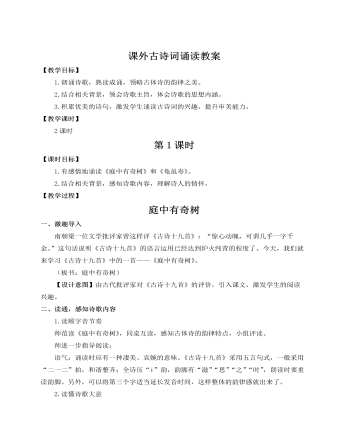
人教部编版语文八年级上册课外古诗词诵读教案
预设 反映了海边农村残破、荒凉的景象,表现了作者对下层人民的深切同情。【设计意图】“三分诗七分读”,学生反复诵读,与文本对话,感知诗歌的韵律和节奏,读出情味,为理解诗歌情感做铺垫。三、品读诗歌,含英咀华师:请同学们仔细品读这首诗,思考以下问题。设问1:曹植在海边看到了怎样的情景?预设 民不聊生,破败荒凉。其中,“寄身”三句,从生活环境、生活艰难和居住环境三个方面实写“边海民”的悲惨生活。海民寄身于“草野”,过着非人的生活,生吞活剥,巢息穴居,所以说“象禽兽”;他们不敢出来,怕被人发现、抓走,每天就钻在山林里边,所以说“行止依林阻”。一个“依”字把难民们的实际活动和恐惧心理都表现出来了。“狐兔翔我宇”一句通过对狐狸、兔子的描写,侧面描绘出海边贫民家庭条件的恶劣以及家园的破败。全诗正面描写与侧面烘托相结合,使海边贫民悲惨的生活图景跃然纸上。设问2:诗中哪一句最能体现作者的情感?
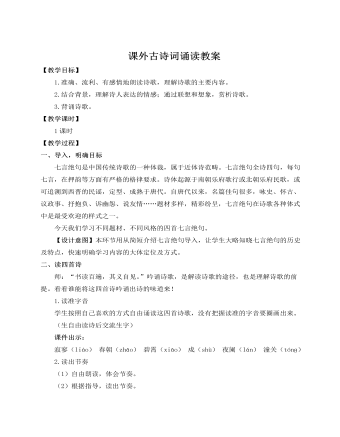
人教部编版七年级语文上册课外古诗词诵读(二)教案
材料二:锦瑟无端五十弦,一弦一柱思华年。庄生晓梦迷蝴蝶,望帝春心托杜鹃。沧海月明珠有泪,蓝田日暖玉生烟。此情可待成追忆?只是当时已惘然。(李商隐《锦瑟》)相见时难别亦难,东风无力百花残。春蚕到死丝方尽,蜡炬成灰泪始干。晓镜但愁云鬓改,夜吟应觉月光寒。蓬山此去无多路,青鸟殷勤为探看。(李商隐《无题》)材料三:《十一月四日风雨大作》(其二)作于南宋光宗绍熙三年(1192)十一月四日。陆游自南宋孝宗淳熙十六年(1189)罢官后,闲居家乡山阴农村。当时诗人已经68岁,虽然年迈,但爱国热情丝毫未减,日夜惦念报效国家,可诗人收复国土的强烈愿望,在现实中已不可能实现,于是,在一个“风雨大作”的夜里,诗人触景生情,由情生思,在梦中实现了自己金戈铁马驰骋中原的愿望。死去元知万事空,但悲不见九州同。王师北定中原日,家祭无忘告乃翁。(陆游《示儿》)材料四:清朝同治四年(1865),谭嗣同出生于北京宣武城,其父谭继洵时任湖北巡抚。光绪元年(1875),谭嗣同10岁时,拜浏阳著名学者欧阳中鹄为师。
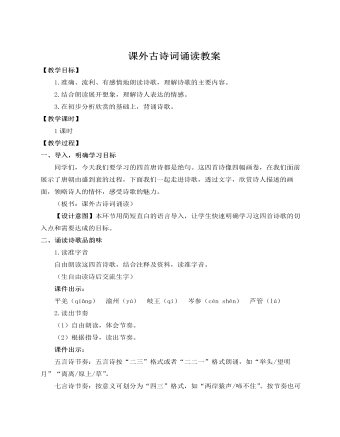
人教部编版七年级语文上册课外古诗词诵读(一)教案
(1)示例一(横向联想) 李白的送别诗:①“思君不见下渝州”,表达依依惜别的无限情思,可谓语短情长。②“仍怜故乡水,万里送行舟”,意思是“我”还是怜爱故乡的水,流过万里送“我”远行。这一句运用了拟人的修辞手法,将故乡水拟人化,借写故乡水有情,不远万里,依依不舍送“我”远别故乡,表达了诗人离开故乡时依依不舍、思念故乡的感情。③“孤帆远影碧空尽,唯见长江天际流。”这两句看起来似乎是写景,但在写景中包含着一个充满诗意的细节。李白一直把朋友送上船,船已经扬帆而去,而他还在江边目送远去的船帆。李白望着帆影,一直看到帆影逐渐模糊,消失在碧空的尽头,可见目送时间之长。帆影已经消失了,然而李白还在翘首凝望,这才注意到一江春水,在浩浩荡荡地流向远远的水天交接之处。“唯见长江天际流”,是眼前景象,可是谁又能说是单纯地写景呢?李白对朋友的一片深情,李白的向往,不正体现在这富有诗意的神驰目注之中吗?诗人的心潮起伏,不正像那浩浩东去的一江春水吗?
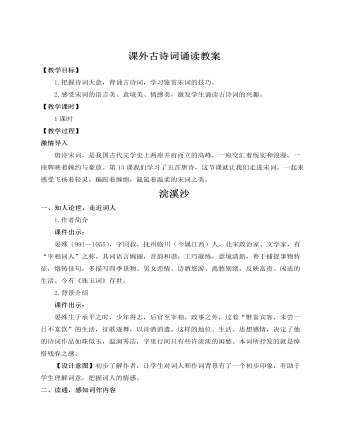
人教部编版语文八年级上册课外古诗词诵读教案
三、品读,感悟词人情怀1.品读“醉”意设问1:再次默读词作。想一想:这首词是围绕哪一个字来写的?从哪些地方可以看出来?预设 “醉”字。表现:沉醉不知归路;误入藕花深处。设问2:词人因何而“醉”?预设 因美酒和美景而“醉”。设问3:除了美景、美酒,还有什么会让李清照“醉”?预设 还有词人和自己的伙伴在一起的那种美好情谊,对年轻时那些美好生活的回忆,都让她深深陶醉。师小结:李清照的“醉”既是酒醉更是陶醉。其实不管“兴”也好,“记”也罢,“醉”也好,还是“误”也好,作者是“字字如金”。因为“兴”所以“醉”,因为“醉”所以“误”,因为“醉”,所以常常记得。2.品字悟情设问1:如何理解两个“争渡”表达出的情感?预设 两个“争渡”,表现了主人公急于从迷途中找寻出路的焦灼心情。正是由于“争渡”,所以又“惊起一滩鸥鹭”,把停栖在沙洲上的水鸟都吓飞了。至此,词戛然而止,言尽而意未尽,耐人寻味。
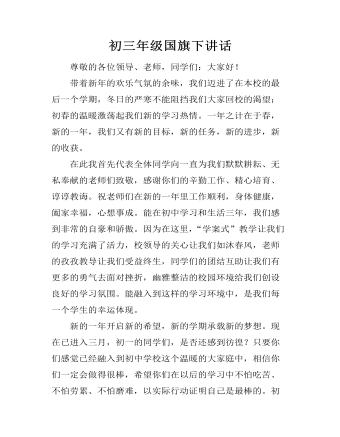
初三年级国旗下讲话
尊敬的各位领导、老师,同学们:大家好!带着新年的欢乐气氛的余味,我们迈进了在本校的最后一个学期,冬日的严寒不能阻挡我们大家回校的渴望;初春的温暖激荡起我们新的学习热情。一年之计在于春,新的一年,我们又有新的目标,新的任务,新的进步,新的收获。 在此我首先代表全体同学向一直为我们默默耕耘、无私奉献的老师们致敬,感谢你们的辛勤工作、精心培育、谆谆教诲。祝老师们在新的一年里工作顺利,身体健康,阖家幸福,心想事成。能在初中学习和生活三年,我们感到非常的自豪和骄傲。因为在这里,“学案式”教学让我们的学习充满了活力,校领导的关心让我们如沐春风,老师的孜孜教导让我们受益终生,同学们的团结互助让我们有更多的勇气去面对挫折,幽雅整洁的校园环境给我们创设良好的学习氛围。能融入到这样的学习环境中,是我们每一个学生的幸运体现。新的一年开启新的希望,新的学期承载新的梦想。现在已进入三月,初一的同学们,是否还感到彷徨?只要你们感觉已经融入到初中学校这个温暖的大家庭中,相信你们一定会做得很棒,希望你们在以后的学习中不怕吃苦、不怕劳累、不怕磨难,以实际行动证明自己是最棒的。初二的同学们,你们是否还沉浸在无忧无虑、洒脱嬉闹的生活中呢?
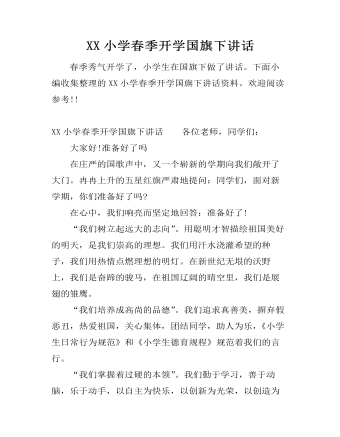
XX小学春季开学国旗下讲话
春季秀气开学了,小学生在国旗下做了讲话。下面小编收集整理的XX小学春季开学国旗下讲话资料。欢迎阅读参考!!XX小学春季开学国旗下讲话 各位老师,同学们:大家好!准备好了吗在庄严的国歌声中,又一个崭新的学期向我们敞开了大门。冉冉上升的五星红旗严肃地提问:同学们,面对新学期,你们准备好了吗?在心中,我们响亮而坚定地回答:准备好了!“我们树立起远大的志向”。用聪明才智描绘祖国美好的明天,是我们崇高的理想。我们用汗水浇灌希望的种子,我们用热情点燃理想的明灯。在新世纪无垠的沃野上,我们是奋蹄的骏马,在祖国辽阔的晴空里,我们是展翅的雏鹰。“我们培养成高尚的品德”。我们追求真善美,摒弃假恶丑,热爱祖国,关心集体,团结同学,助人为乐,《小学生日常行为规范》和《小学生德育规程》规范着我们的言行。“我们掌握着过硬的本领”。我们勤于学习,善于动脑,乐于动手,以自主为快乐,以创新为光荣,以创造为自豪,积累丰富的知识,培养求异的精神,锻炼实践的能力,形成良好的习惯。
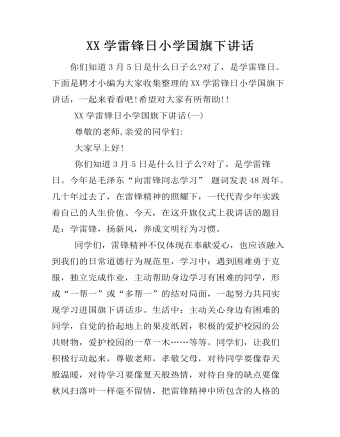
XX学雷锋日小学国旗下讲话
你们知道3月5日是什么日子么?对了,是学雷锋日。下面是小编为大家收集整理的XX学雷锋日小学国旗下讲话,一起来看看吧!希望对大家有所帮助!!XX学雷锋日小学国旗下讲话(一) 尊敬的老师,亲爱的同学们: 大家早上好! 你们知道3月5日是什么日子么?对了,是学雷锋日。今年是毛泽东“向雷锋同志学习” 题词发表48周年。几十年过去了,在雷锋精神的照耀下,一代代青少年实践着自己的人生价值。今天,在这升旗仪式上我讲话的题目是:学雷锋,扬新风,养成文明行为习惯。 同学们,雷锋精神不仅体现在奉献爱心,也应该融入到我们的日常道德行为规范里,学习中:遇到困难勇于克服,独立完成作业,主动帮助身边学习有困难的同学,形成“一帮一”或“多帮一”的结对局面,一起努力共同实现学习进国旗下讲话步。生活中:主动关心身边有困难的同学,自觉的拾起地上的果皮纸屑,积极的爱护校园的公共财物,爱护校园的一草一木……等等。同学们,让我们积极行动起来,尊敬老师,孝敬父母,对待同学要像春天般温暖,对待学习要像夏天般热情,对待自身的缺点要像秋风扫落叶一样毫不留情,把雷锋精神中所包含的人格的自我修炼,美好、温暖的人际关系,在我们的学习生活中落实体现,为构建和谐校园,和谐上实附小而努力。



